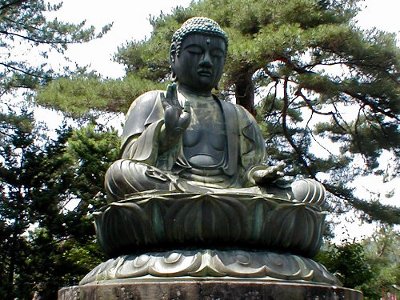
Yifa is a Taiwanese Buddhist nun ordained by the Fo Guang Shan order (aka International Buddhist Progress Society), a recently founded (1967) order which promotes “Humanistic Buddhism”.
She holds a law degree from the Taiwan National University, an MA in comparative philosophy from the University of Hawaii and PhD in religious studies from Yale.
She lives in California here; and I assume this is where Kuhn interviewed her. (BTW, if you’re ever in Southern California, that temple is worth a visit.)
Watch her interview with Robert Kuhn here (click the blue “Play Video” button) and then keep reading for my take.
Realizing that the question “Is God a person?” doesn’t seem suitable to ask a Buddhist (sort of like asking a Christian which is their favorite bodhisattva) Kuhn modifies the question to: “What is the best way to think about God’s existence?”
Yifa relates how she used to assume that intelligent people didn’t believe in God, but then discovered that a Christian friend assumed that intelligent people didn’t believe in reincarnation. (This latter was indeed was a central part of ancient, Indian Buddhism, although it is much downplayed, ignored, or denied by present-day Buddhists, as she mentions.) This makes the obvious point that people from different traditions make different assumptions about what is reasonable to believe. She wants to say that it’s all a matter of “conceptualization”, which of course, doesn’t at all answer the question.
Thus, Kuhn presses her for her own views. Like all Buddhists, she doesn’t like the idea of a creator. In short, where’d God come from? You say that he’s always been around? She moves on, but presumably she wants to cry foul here. Of course, the main Christian answer isn’t just that God’s always been around (or is eternal), but rather that God exists necessarily and/or he exists a se (through himself, so not because of anything else); he’s the kind of reality which couldn’t not exist, and so couldn’t be created. Ergo, the question “Where does God come from?” is confused – a total miss which is often mistaken for a fatal shot.
Where does this cosmos come from? Buddhism assumes that it has always been around.
Well sure; but one might think that the cosmos has always been around, and yet think that its existence needs explaining in terms of something else, for the cosmos doesn’t seem to exist a se, or necessarily.
Yifa suggests, though, that such a hypothesis is unnecessary, for the existence of the cosmos is explained by all the causal “conditions coming together”. Where’d they come from? “Other conditions”. This, of course, is what she must say. But it misses the point, if you think there needs to be something which explains why there are “conditions”, i.e. why there is a cosmos at all. I’m not sure that she quite “gets” some of the philosophical motivations for theism, which you see expressed in any cosmological argument for God’s existence.
She seem to deny that there could be a beginning to the cosmos – or at least, she claims that the view that there was a beginning is puzzling. I agree with that, and also that the view that time goes infinitely backwards is puzzling.
This bring her to an anti-metaphysics theme, a thread in Buddhist thinking which goes back to some much-discussed passages in the Pali canon (= the canon according to Theravada Buddhists, part of the canon to others). In short, our minds are inaequate to answer questions about how things are (e.g. did the cosmos begin to exist or not) – or at least, some subset of “metaphysical” questions. In her view, echoing the famous Indian philosophers Nagarjuna and countless later Buddhist thinkers, we need to “see the limitation of all our conceptualization”.
So our minds are inadequate to grasp whatever is “beyond” the cosmos. Some kind of (non-rational?) “breakthrough” is of course possible, though she doesn’t say to much about this subject (enlightenment). Enlightenment, or the attainment of “Nirvana” is the “cure” which any form of Buddhism offers to the human condition. This is indeed an interesting subject, but it isn’t going to help us answer the question addressed by this series here on trinities.
